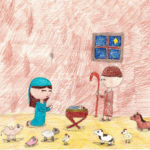By Sarah Callahan
Grey Space Graces

Twinkling lights, aromatic ovens, nostalgic tunes, hot cocoa and cold toes — it’s almost that time of year. As the holiday cheer comes upon us, so does the family time. It’s exciting, right? For sure. Yet even when we are overjoyed to see our families, it can still be difficult to share so much time (and so little space) with them.
When we are apart, we long for the familiarity of their laughter, for the stories shared over the dinner table, and for the making of new memories. Yet, after the small talk, (“so, what’s new with you?” “How is work going?” “The little guy has gotten so big — what grade is he in now?”) the less amicable and more divisive topics can rise to the surface. This year, I am going to try to prepare myself, and I hope you’ll join me, to respond more charitably and to make those often-frustrating conversations more fruitful.
So, let’s explore three ways we can keep our cool when the temperature of conversations start to rise.
Have a grounding prayer to lean on.
Pope Francis often uses the term, “God’s style,” and defines it as “closeness, compassion, and tenderness.” Before we get to the family gathering, as we sit down at the table, and when a family member says something that makes us raise an eyebrow, we can repeat to ourselves a prayer that grounds us in charity. Something like, “Jesus, help me to show your tenderness to this person.” Being intentional about the way we come into a situation can make a positive impact on our experience of it.
Ask questions
Curiosity is often a better driver to a conversation than trying to convince someone of an idea, belief or position. Let’s ask ourselves a few things. (1) What life experiences may have led this person to this belief? (2) What life experiences have I had that led me to disagree with this viewpoint? (3) What is at stake for this person (or what might this person believe is at stake) in this issue?
Often, our deepest-held beliefs come from life experiences that we’ve had. It can be difficult to keep an open mind to other positions because it feels like there is much on the line when it comes to this issue, policy, etc. Let’s paint a picture to make this more concrete.
Let’s say Aunt Linda brings up that she is uncomfortable with talk in the Church about women needing more opportunities for leadership in the Church. She has been Catholic her whole life and hasn’t felt excluded herself. She explains that the Church has come very far in the inclusion of women to leadership positions. To you, this may feel frustrating. To you, it may feel clear that women have gifts to enrich decision-making spaces and that although the Church has grown in this area, there is more we can do.
Instead of letting this situation get hostile, let’s ask ourselves the above questions. Perhaps Aunt Linda had the same feeling as you when she was younger, that women should play a bigger role in the Church. Maybe Aunt Linda has worked many years to accept the Church’s teachings and norms around women’s roles and now that she has, she feels like the Church is changing. If we put ourselves in Aunt Linda’s shoes, we can understand how this would feel unsettling. We can understand that much is at stake for her. Now, we’re talking about concrete human experience and understanding of identity, not just having a disagreement about abstract and distant issues. Now, it’s easier to understand where Aunt Linda is coming from. We may feel less of a need to convince her of a position and instead curious to hear more about her experience as a woman in the Church.
Take a deep breath, don’t take yourself too seriously, and know when to step away.
A deep breath is always available to us. It is good to take a moment to remind ourselves that this is not the “be-all and end-all.” Even if we deeply disagree with someone, being contentious will likely not bring about any sort of solution. Often humor is healing and can lighten the situation. If all else fails, it’s okay to remind the “Aunt Lindas” in our lives that we love them and to change the subject or step out of the conversation. Our relationships are likely not worth compromising over one issue or disagreement.
It can be difficult to remember that some sort of common ground exists between our “Aunt Lindas” and us. Yet, maybe we both agree that family is important, that God is merciful, that apple pie is best or that “there’s always next year” for the Chicago Cubs. We are bound to have disagreements at times, but the most essential thing we all have in common is our humanness and our being made in the image of God.
Being human is a beautiful, messy, frightening, hilarious and absurd thing. None of us has everything figured out, we are all broken and we all need something more than ourselves. As long as we can remember this, we may find ourselves better reflecting “God’s style” this holiday season and responding to those across the table from us with greater closeness, deeper compassion and more authentic tenderness.
(Sarah Callahan is social media coordinator for the Diocese of Davenport.)












This was a nice article, Sara. Your suggestion as to how to manage ideological differences during family gathers are effective for all ages.